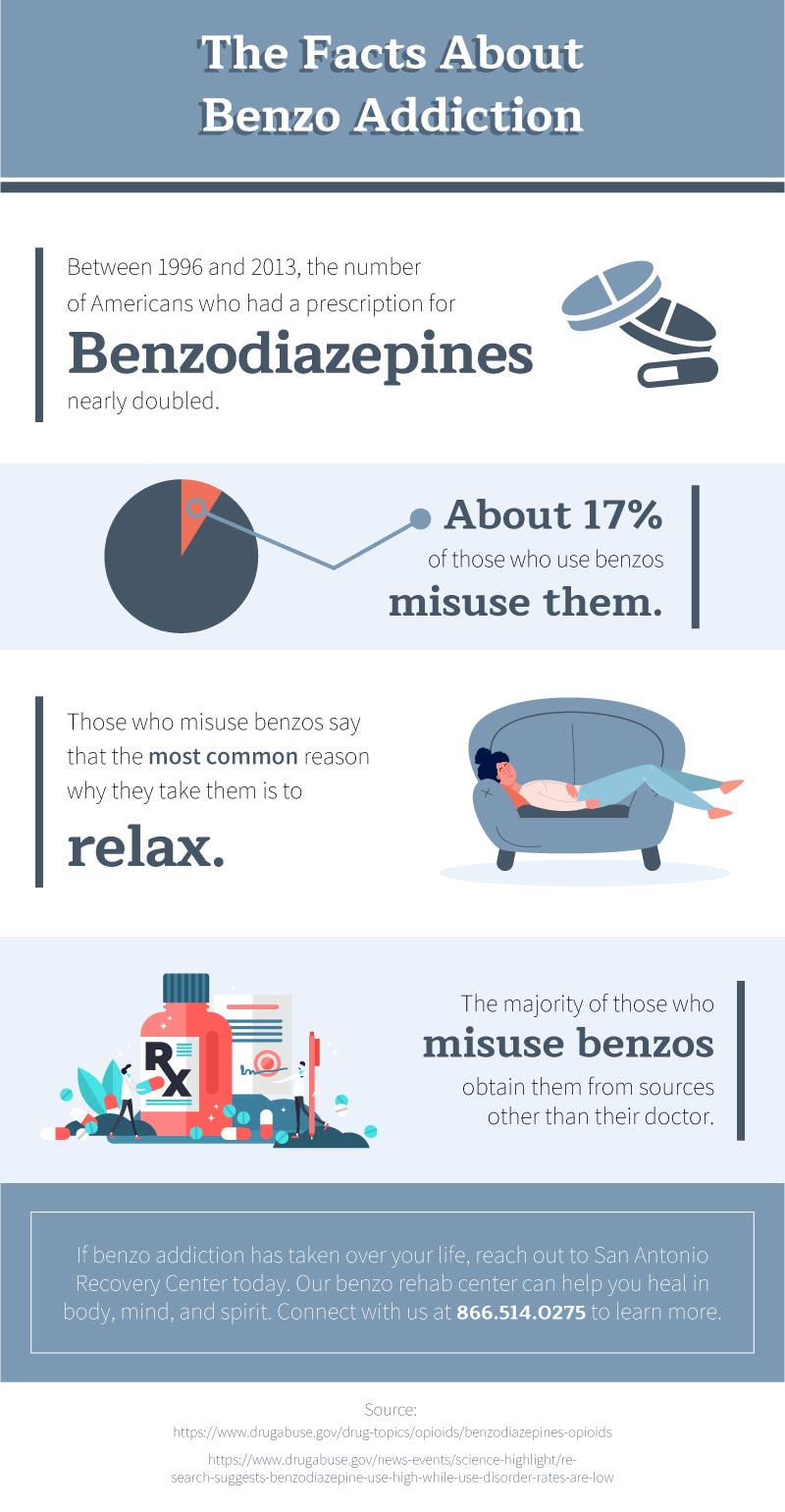
Benzodiazepines, or benzos, are commonly prescribed sedatives that can also be incredibly addictive. Many of those who struggle with benzo addiction, characterized by compulsive use of benzos, started out with a prescription. Signs of benzodiazepine dependence can include taking them without a prescription, taking more than prescribed, or taking them in order to obtain a high. At San Antonio Recovery Center, we offer a benzo rehab program that can help you or your loved one build a strong foundation for lifelong sobriety.
Benzo addiction can be dangerous. We offer comprehensive support in a safe and welcoming environment so that you can begin to heal. Through talk therapy, medication and medical care, and experiential therapies, you’ll rebuild your life.
Learn more by reaching out to San Antonio Recovery Center today at 866.957.7885 or by connecting with our team online.
Benzodiazepines are prescription sedatives that are typically prescribed to treat people with generalized anxiety disorders, social anxiety, panic attacks, and even alcohol withdrawal. These medications have calming effects and can help those who struggle to function during the day due to anxiety or who can’t sleep at night.
Commonly prescribed benzos include:
Benzos have a high potential for dependence if misused. If you’ve been prescribed benzodiazepines, even for a legitimate medical reason, be sure to closely follow your doctor’s instructions and to talk to them about any concerns you may have.

Benzos come in pill form and are taken by mouth. The medication may be ultra-short acting, short-acting, or long-acting. This refers to the amount of time it stays in your system, not how long it takes to go into effect. Therefore, no matter what type you take, you feel the effects quite quickly—that’s why they are beneficial for panic attacks. You will typically feel the effects of benzos within approximately 15 to 30 minutes.
Benzodiazepines provide calming and sedating effects by raising the level of the inhibitory neurotransmitter GABA in the brain. These medications can also affect the central nervous system and relax the muscles.

Any medication that impacts your mood or works on the brain has the ability to be addictive. This medication has the ability to cause addiction relatively quickly. Physicians usually only prescribe them on a temporary basis—for about 30 days. However, when prescribed for longer or people get them elsewhere, then the risk for addiction increases. In addition, people who take benzos for even one month may experience withdrawal symptoms when stopping the medication. The severity of the withdrawal depends on the dosage amount and how long the person was taking the medication.
When withdrawing from this medication after taking it for some time, it’s best to contact a benzodiazepine addiction treatment center. In addition, withdrawal can be severe and may include seizures. An addiction treatment center will be able to monitor your condition and ensure your safety. Also, they may administer other medication to ease symptoms.
Aside from the possibility of becoming addicted to benzos, other dangers exist. Emergency room visits involving benzos were often a result of mixing this medication with opioids. In addition, if you consume alcohol while taking benzos, there may be serious consequences. Finally, taking more medication than prescribed could lead to problems as well.
Not sure if a benzo rehab program is right for you? Consider the following:
If you can answer “yes” to any of the above, reach out to San Antonio Recovery Center today at 866.957.7885.
At San Antonio Recovery Center, we help those who are struggling with benzo addiction through personalized treatment plans. No two individuals in recovery are alike, and that’s why we complete a thorough intake evaluation of each patient. During this evaluation, we learn more about our patients’ needs and goals for treatment.
Treatment always begins with medical detox. We provide 24/7 supervision to ensure that our patients are safe during detox. Certain medications can ease withdrawal symptoms, which could include headaches, muscle pains, nausea and vomiting, insomnia, and anxiety.
During treatment, our patients participate in both group and individual therapy sessions. During group therapy, you’ll connect with others in recovery. You can build a strong network of support to help you as you tackle challenges on the road to recovery. During individual therapy sessions, you’ll work through the underlying causes of addiction with the help of an experienced therapist.
Other types of therapy we offer include:
Many individuals who struggle with benzo addiction also face co-occurring mental health issues like anxiety. We address these co-occurring disorders at the same time as substance use issues. Without simultaneous treatment, some individuals might relapse when they encounter mental health challenges in the future. Through dual diagnosis treatment, however, our patients learn how to manage the symptoms of mental health issues without turning to drugs or alcohol.
We offer both inpatient and outpatient treatment options. While the same high-quality care and support are available to patients in all of our treatment programs, many individuals benefit from the structure found in our residential programs. Especially for those going through detox or who are struggling with severe addictions, inpatient treatment can be beneficial. During inpatient programs, our patients live in our comfortable and secure facility. San Antonio Recovery Center is not a hospital setting. Instead, our rooms and treatment spaces have been designed with our patients in mind, with amenities that will help you feel at home.
However, for many of those in recovery from benzo addiction, outpatient programs provide flexibility as well as support for the transition out of residential treatment. Our outpatient programs allow patients to live at home while in treatment. If you have a stable and supportive living situation, outpatient care can help you keep up with responsibilities while building healthy coping skills.
Our team can help you during the admissions process and create a treatment plan addressing your unique needs. No matter where you are on your journey to recovery, we can help.
At San Antonio Recovery Center, you’ll find a benzodiazepine addiction treatment center that truly cares. Our compassionate and professional staff is ready to help you through the withdrawal process. In addition, we will walk beside you as you step towards a bright future. Some of our programs include:
Don’t let addiction take over your life. A benzodiazepine addiction treatment center will bring you to a place of peaceful tranquility. Contact us at 866.957.7885 or reach out online, and we’ll get you on the path to healing.
contact us now!
